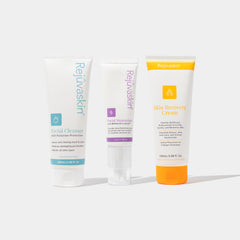Here’s the thing— contrary to media portrayal, stretch marks happen to everyone. They’re not just a “ladies issue”, though they are perhaps best known as a side effect of pregnancy. Stretch marks can happen in a variety of situations that cause your skin to grow and stretch more rapidly than normal. Aside from pregnancy and weight fluctuations, working out is one of the most common ways people get stretch marks. So what can you do to prevent them?
What Causes Stretch Marks?
Stretch marks are basically light scar tissue. As the tissue underneath the outer skin layer expands, sometimes skin doesn’t have enough time to replicate cells to completely cover the new volume. To cope with this, scar tissue is used to fill the gaps, mainly because it can be formed so quickly by the body and it can span moderate distances.
This excessive skin stretching and subsequent scarring can happen in a number of locations, but it’s most common on the bellies of pregnant women. If your body expands (through normal growth or exercise) too quickly, stretch marks can also occur in these situations. Individuals with dry skin tend to be more prone to developing stretch marks— this is because only properly moisturized skin is elastic and strong enough to withstand stretching.
How To Prevent Stretch Marks From Working Out
Working out has many benefits. One small price you might pay, however, are small, pale stripes on your arms, thighs, butt, etc. As your muscles grow bigger and more toned, you might need more skin to cover them. When your skin can’t keep up with your muscle growth, stretch marks appear.
Since scars never truly disappear, the best approach to being rid of stretch marks is to prevent them in the first place, which these tips will help you do, if you start early enough. Even if you already have a few stretch marks on shoulders, arms, and legs, however, we can also greatly reduce their appearance!
1 - Drink Plenty of Water
Since one of the main components of healthy, elastic skin is water, it’s important to stay properly hydrated. If you are losing a lot of your body’s hydration due to exercise, be sure to replenish that loss properly and keep your electrolyte balance in check.
2 - Keep Your Skin Moisturized
We lose an astonishing amount of water through our skin every day, through sweat and simple evaporation on dry days. Since physically dry skin is more prone to damage, it’s recommended that you take steps to moisturize your skin and lock that moisture in with some type of barrier cream.
3 - Fuel Your Body Properly
There are several critical components to healthy, elastic skin, many of which you’re probably already familiar with: vitamin E, collagen, and elastin. However, omega-3 fatty acids are also extremely important in maintaining healthy, well-moisturized skin. Plant-based sources like walnuts, flaxseed, and olive oil are great choices, as is salmon.
4 - Avoid “Stripping” Agents
Moisturization is a two-fold process; you have to consider both the internal supply of hydration and the external barrier that prevents its loss over time. Skin naturally produces an oily substance called sebum that locks in moisture. Unfortunately, dry weather, synthetic fabrics, and soaps can “strip” away this natural barrier too frequently, causing our skin to become dry. If your skin is frequently exposed to these things, it will be extremely important for you to use a great barrier cream after applying moisturizers.
5 - Use The Best Stretch Mark Cream
Even if you don’t have stretch marks yet, you can still be applying a cream that is designed to even skin tone and lock in moisture. Since most stretch mark products prioritize moisturizing the skin, they are generally great all-around skincare products. For example, our Rejuvaskin Stretch Mark Cream uses shea butter, cocoa butter, and aloe vera to deposit and lock in moisture; we also use ceramides and polypeptides to stimulate collagen production and reduce the breakdown of collagen from stretching.
If you’re starting to target your thighs, buttocks, shoulders, or arms for body-building, start applying these prevention tips now. Prepare your skin for the stretching that will occur as you start to build muscle mass; after all, an ounce of prevention is worth a pound of cure.





















Leave a comment